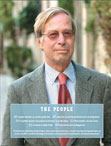Introducing Jason Schultz
Associate Professor of Clinical Law
Printer Friendly VersionIn 2009, Jason Schultz approached Professor Erin Murphy to put together a conference on social media and the criminal justice system, her specialty. “This was in the early days,” she recalls, before the intersection of the two was even on the radar. “The next thing you know, we attracted a number of key stakeholders,” including policymakers from Facebook and the FBI.
“It was a collaboration,” says Schultz. “That’s what I love.” Held at the University of California, Berkeley School of Law, where they then both taught, the conference resulted in a best practices booklet that was adopted by public defenders statewide.
Schultz is a clinical intellectual property scholar and activist with a focus on patent reform and a passion for technology. He browses websites that fund innovative projects; visits open community labs, where computer and technology folks share ideas; and experiments with technologies such as 3-D printers. “He’s the guy to pass on a really interesting link and also to know about the hip new bar,” says Murphy.
Devoted to ensuring that the world of patents and copyrights is a safe, collaborative space for innovation, Schultz is making an impact. He founded the Patent Busting Project at the Electronic Frontier Foundation (EFF), a nonprofit digital rights group. And as co-director of Berkeley’s Samuelson Law, Technology & Public Policy Clinic since 2004, he brought successful lawsuits against “patent trolls”—entities that enforce their patents against alleged infringers often with no intention of manufacturing the product.
He joins the Law School as director of the Technology Law and Policy Clinic, which he began while visiting last year. “Most people think of IP as huge corporations with thousands of patents that they enforce on products. But that’s not what I’m focused on,” says Schultz. Partnering with lawyers from the American Civil Liberties Union, “the clinic focuses on how new technologies benefit society at large and individual citizens, especially those without a lot of resources.”
Clinic student Ava McAlpin ’13 says that Schultz created a comfortable environment for students to experiment in their role as lawyers. Because she co-chaired the Art Law Society, he suggested that the society write a comment on legislation regarding artists’ resale royalty rights, and he helped them organize a star-studded panel discussion with senior people from the US Copyright Office and artist Frank Stella.
Schultz’s scholarship explores the struggle to balance IP law with free expression and access to knowledge and innovation, particularly regarding new digital technologies. He has written extensively about the first-sale doctrine, which permits resale of copyrighted goods without permission of the copyright owner. First-sale issues are rapidly becoming more complex with easy access to Internet resale markets like eBay and Amazon. He is currently co-authoring a paper with Aaron Perzanowski of Wayne State University that investigates what it means to own a digital object “legally.”
Along with Samuelson Clinic Co-Director Jennifer Urban, Schultz invented the Defensive Patent License (DPL), a tool for de-escalating the patent wars. “There are a lot of small companies that are open-source, that publish their code because they want to be based in a community of people who make and share technology.” Patent trolls prey upon them, he says, and none can afford to defend itself. The DPL “offers them a way to band together, to create a circle-the-wagons approach.”
He and Urban laid out their plan in “Protecting Open Innovation: The Defensive Patent License as a New Approach to Patent Threats, Transaction Costs, and Tactical Disarmament” (Harvard Journal of Law and Technology, Fall 2012). DPL users pledge to make their patents available to everyone in the DPL network for free and refrain from suing network members for any reason other than defense. “It creates a shield, a collective defense against patent threats that allows them to patent for good,” he says. Even Google has shown an interest in joining the DPL network.
“Jason and Jen’s work on the DPL and similar ideas have catalyzed a conversation in the community about what companies can do themselves to stop the patent madness,” says Colleen Chien of Santa Clara Law. “The impact could be huge.”
Schultz grew up in Berkeley, the younger son of an elementary school teacher, Hilary, and a cardiologist, Clifford. His dad bought him his first computer, an Apple II, when he was in first grade. By middle school, Schultz was programming and chatting in the earliest chat rooms. “It took 25 different steps to get into a chat room,” he recalls. “It was only for the geeks.”
Always interested in other perspectives, he majored in women’s studies at Duke University, opening his world to a range of social justice issues. Schultz earned his bachelor’s degree in 1993, got his JD from Berkeley Law in 2000, and worked at a San Francisco law firm litigating patent and copyright cases for high-tech clients. “Then I got my first dream job,” he says—staff attorney for EFF—and a chance “to change the world.”
A combination of factors lured Schultz to NYU. “It doesn’t interest me to be the only person to do what I do, no matter what spotlight you get. I like to have colleagues,” he says, emphasizing NYU’s strong and diverse IP and clinical faculties. He is also excited by what he sees in the Law School’s passionate students, and New York City’s recent surge in high-tech initiatives.
—

